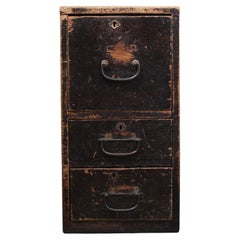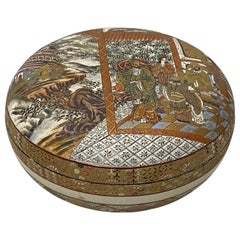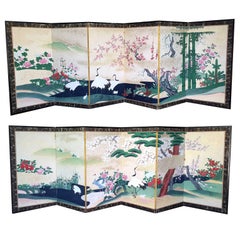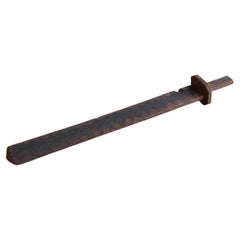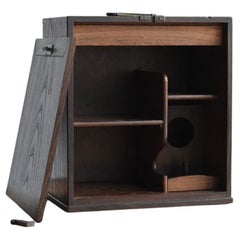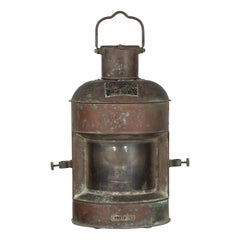Japanese More Asian Art, Objects and Furniture
to
33
118
47
200
1
2
1
1
19
80
101
1
62
18
5
11
3
5
1
2
1
3
1
82
71
40
34
16
13,993
1,725
805
672
546
201
201
201
2
1
1
1
1
Place of Origin: Japanese
Japanese Antique Drawer 1860s-1920s/Chest of Drawers Wabisabi Art
Located in Sammu-shi, Chiba
It is an old Japanese drawer.
It is an item of the Meiji era (1860s-1920s)
The material is cedar.
The shade of brown is beautiful and the taste is wonderful.
The drawer also ...
Category
Early 20th Century Meiji Japanese More Asian Art, Objects and Furniture
Materials
Cedar
Exquisite Hand Painted Japanese Satsuma Lidded Bowl
Located in San Francisco, CA
Exquisite Hand Painted Japanese Satsuma Lidded Bowl
A stunning lidded Japanese Satsuma bowl, likely Meiji period, completely hand painted inside and out. This could be used on your ...
Category
Mid-20th Century Anglo-Japanese Japanese More Asian Art, Objects and Furniture
Materials
Porcelain
Pair of Rare Antique Japanese Folding Screens with Provenance
Located in Atlanta, GA
An amazing pair of matching antique Japanese folding screen predating 1812-1813, most likely from Kano School. Six panels each depict C...
Category
1810s Japonisme Antique Japanese More Asian Art, Objects and Furniture
Materials
Brass
Wooden Sword of Old Japanese Buddha / 1800-1900 / Wall-Mounted Object
Located in Sammu-shi, Chiba
This is an introduction to a slightly unusual item.
This is a wooden sword possessed by the Buddha statue.
Only the sword remained.
Gods such as Fudo Myo, who reign as Buddhist guardians...
Category
19th Century Edo Antique Japanese More Asian Art, Objects and Furniture
Materials
Cedar
Japanese Small Wooden Box with Beautiful Wood Grain Made of Mulberry
Located in Sammu-shi, Chiba
This is a small storage box for storing old Japanese tea utensils.
It is called [kikyoku] in Japanese.
This wooden box comes in a variety of mate...
Category
Early 20th Century Taisho Japanese More Asian Art, Objects and Furniture
Materials
Other
Vintage Japanese Ship's Navigation Stern Light by Nippon Sento Co, Ltd
By Nippon Sento Company Ltd
Located in Yonkers, NY
A Japanese metal ship's navigation stern light from the mid 20th century, made by Nippon Sento Co, ltd, with oxidized patina. Created in Japan during the mid 20th century, this stern...
Category
Mid-20th Century Japanese More Asian Art, Objects and Furniture
Materials
Metal
Pair of Japanese Hinamatsuri Gold Lacquered Candleholders with Lotus Bobèches
Located in Yonkers, NY
A pair of Japanese vintage gold lacquered candleholders from the mid 20th century with lotus bobèches from a Hinamatsuri set. Created in Japan during the midcentury period, each of this pair of candleholders features a lotus shaped bobèche sitting above a simple shaft resting on a gadrooned base. Showcasing red undertones, this pair of gold lacquered candleholders, taken from a Hinamatsuri set (Hinamatsuri being a festival also called Girls...
Category
Mid-20th Century Japanese More Asian Art, Objects and Furniture
Materials
Wood
Japanese Antique Wooden Board , Wall Decoration Abstract Art , Wabi-Sabi
Located in Katori-Shi, 12
This wooden board was made in the Taisho era.
It was used as a "mochi board." A "mochi board" is a board from the Meiji era that was used as a workbench for kneading flour, and is m...
Category
Early 20th Century Taisho Japanese More Asian Art, Objects and Furniture
Materials
Wood
Large Wood Carved Otafuku, Goddess of Mirth, Japanese, Early 20th Century
Located in Point Richmond, CA
Large wood carved Otafuku , Goddess of Mirth, Japanese, 20th Century.
Sometimes known as Okame, a beloved and popular symbol in Japanese culture. With plump cheeks and joyful smile...
Category
Early 20th Century Other Japanese More Asian Art, Objects and Furniture
Materials
Wood
Japanese Meiji Satsuma Finely Decorated and Gilded Dragon Handle Scenic Teapot
By Satsuma
Located in Sarasota, FL
Japanese Meiji satsuma finely decorated and gilded teapot. Some of the finest hand painted work and sculpted shape found on satsuma. Maker's mark on the bottom.
Category
Late 19th Century Meiji Antique Japanese More Asian Art, Objects and Furniture
Materials
Pottery
Porcelain Wall Plate, Japan, 19th Century
Located in Roma, IT
This porcelain wall plate is a decorative object manufactured in Japan at the end of the 19th century.
This refined wall plate is completely ma...
Category
1970s Vintage Japanese More Asian Art, Objects and Furniture
Materials
Porcelain
Antique Work Board Used by Japanese Craftsmen/1868-1920/Wabi-Sabi Wall Painting
Located in Sammu-shi, Chiba
If you want something special, we recommend purchasing items selected by Brood.
We sell carefully selected old Japanese items.
I've seen tens of thousands of items so far.
Based o...
Category
Late 19th Century Meiji Antique Japanese More Asian Art, Objects and Furniture
Materials
Cedar
Japanese Black and Gold Lacquer Kaioke Boxes 'Hokaibako'
Located in PARIS, FR
Two big eight-sided kaioke boxes in black lacquer, decorated with mon and maple leaves in golden lacquer.
These are usually octagonal boxes containing the painted shells used in ...
Category
Late 19th Century Antique Japanese More Asian Art, Objects and Furniture
Materials
Lacquer
Japanese Antique Wooden Object/Craftsman's Workbench/Penis-Shaped Figurine
Located in Sammu-shi, Chiba
Introduce interesting items.
This was once used as a workbench in Japan.
It's shaped like a penis, but one side of the tip has a mark that looks like it was hit and is slightly scr...
Category
Late 19th Century Meiji Antique Japanese More Asian Art, Objects and Furniture
Materials
Wood
Japanese Antique Small Vase Made of Tin/1800s-1920/Casting Vase
Located in Sammu-shi, Chiba
This is a tin vase made from the late Edo period to the early Taisho period (1800s-1920).
It is made of cast iron and has detailed and beautiful expressions such as butterflies and ...
Category
19th Century Edo Antique Japanese More Asian Art, Objects and Furniture
Materials
Tin
Japanese Bronze Patinated Footed Pot
Located in Queens, NY
Oriental Japanese (19th Century) bronze large jardiniere with a green patina and carp in relief and raise on 4 cloud form feet (Koyoto School; Meiji Period)
Category
19th Century Meiji Antique Japanese More Asian Art, Objects and Furniture
Materials
Bronze
Small Japanese Meiji Period Black and Gold Altar Stand
Located in Hudson, NY
This small late 19th-century Meiji period altar or stand with gilded & engraved brass mounts is a refined example of the art of lacquer in Japan. Crafted of deep black shiny lacquer ...
Category
Late 19th Century Meiji Antique Japanese More Asian Art, Objects and Furniture
Materials
Brass
Japanese Edo Period Noh Theater Mask with Red, Black and Golden Patina
Located in Yonkers, NY
A Japanese Edo period "Noh" theater mask from the 17th to 19th century. Created in Japan during the Edo period (1603-1868), this mask captures our attention with its striking expression and contrasting colors. Noh, a form of theater involving music, dance and drama and originating in the 14th century, uses...
Category
19th Century Edo Antique Japanese More Asian Art, Objects and Furniture
Materials
Wood
Japanese Horse Trapping, "Uma-No-Haragake", Tsutsugaki, Cotton, Meiji Period
Located in Point Richmond, CA
Japanese horse trapping, "Uma-No-Haragake", Tsutsugaki, cotton, Meiji period
This type of haragake is called yuiage ("tied up"). The central portion covered the belly of the horse an...
Category
20th Century Meiji Japanese More Asian Art, Objects and Furniture
Materials
Cotton
Japanese Bronze and Champ Leve Censer
Located in San Francisco, CA
Japanese bronze and champleve censer jar. Large elephant handles and a standing elephant finial on the top lid. Six hexagonal sides. Bronze with fine ...
Category
Early 20th Century Qing Japanese More Asian Art, Objects and Furniture
Materials
Bronze
$1,950 Sale Price
31% Off
Japanese Screen "the Song of Everlasting Sorrow"
Located in PARIS, FR
Six-panels screen depicting the exit from the city of a Chinese emperor on horseback and his concubine in a luxurious palanquin.
It may be a scene illustrating the poem The Song of Everlasting Sorrow (Chang hen ge, ???) written by Bai Juyi (772-846), which recounts the tragic love story between the emperor Ming Huang (also known as Tang Xuanzong, 685-762) and his favorite concubine, the beautiful Yang Guifei...
Category
Late 17th Century Antique Japanese More Asian Art, Objects and Furniture
Materials
Silk, Wood, Paper
Japanese Meiji Period 1900s Distressed Iron Cooking Pot with Foliage Motifs
Located in Yonkers, NY
A Japanese Meiji period iron cooking pot from the early 20th century, with foliage motifs and distressed patina. Created in Japan during the early years of the 20th century, this iro...
Category
Early 20th Century Meiji Japanese More Asian Art, Objects and Furniture
Materials
Iron
Japanese Keyaki Elm Tabako-Bon, c. 1900
Located in Chicago, IL
This box with many drawers is a Japanese tabako-bon, or 'tobacco tray,' used to store tobacco and smoking accessories. Believed to have evolved from the t...
Category
Late 19th Century Meiji Antique Japanese More Asian Art, Objects and Furniture
Materials
Brass
Japanese Edo-Meiji Period Lacquered Palanquin
Located in Stamford, CT
A Japanese Edo-Meiji period Palanquin chair for the childrens festival. The form with sliding and hinged doors, decorated in gold hiramaki-e with peonies ...
Category
1890s Edo Antique Japanese More Asian Art, Objects and Furniture
Materials
Lacquer
Japanese Taishō Period Negora Lacquer Arm Stool with Cinnabar Color
Located in Yonkers, NY
A Japanese Taisho period negora lacquer arm stool from the early 20th century, with cinnabar color. Created to be used on an opium bed, this Japanese Taisho ...
Category
Early 20th Century Taisho Japanese More Asian Art, Objects and Furniture
Materials
Wood
Japanese Meiji Period Brass Candle Holder with Scrolls and Medallions
Located in Yonkers, NY
A Japanese Meiji period antique brass square top candle holder from the early 20th century, with intricate carved medallion, calligraphic inscription and ornate base. Created in Japan during the Meiji period in the early years of the 20th century, this elegant brass candle holder features a square top with recessed accent, supported by four elegant scrolling motifs in the corners. The sinuous body, alternating convex and concave lines, swells up in the center to receive a medallion, showcasing various motifs on each side. The ornate base flares up with motifs echoed from the top, but displayed in an inverted manner and on a larger scale. The stand presents a calligraphic inscription at the bottom signifying the maker's mark. With its golden hue, elegant lines and ornate décor...
Category
Early 20th Century Meiji Japanese More Asian Art, Objects and Furniture
Materials
Brass
Meiji Period 19th Century Japanese Cloisonné Charger
Located in Lambertville, NJ
Lovely large Japanese cloisonné enamel charger Meiji Period (1868-1912). Measure: Large 14 inch.
Intricate enamel over brass cloisonné portraying a colorful floral and foliage motif...
Category
1890s Meiji Antique Japanese More Asian Art, Objects and Furniture
Materials
Copper
Group of 4 Musicians, Japan Antique, Meiji Period around 1880
Located in Munich, Bavaria
Hina Matsuri is celebrated in Japan at the beginning of March. It dates back to the Edo period and is celebrated in the family circle. "Hina Ningyo dolls"...
Category
1880s Antique Japanese More Asian Art, Objects and Furniture
Materials
Textile, Wood
$5,616 Sale Price / set
20% Off
Early 20th Century Boro Cloth Fragments, Japanese, C. 1900
Located in London, GB
A collection of late 19th/early 20th century indigo dyed ‘boro’ cloth fragments. Japanese, c. 1900. Mounted on anthracite grey card in box frames with black...
Category
Early 20th Century Japanese More Asian Art, Objects and Furniture
Materials
Fabric, Textile
An Antique Japanese Lacquer Maki-e Tray
Located in Atlanta, GA
A fan shape black lacquer tray from Japan circa 1910-30s, late Meiji to early Showa era. Elaborated decorated with a bundle of yomogi blossom in a very fine Maki-e technique using both gold and silver powders. There is a Japanese symbol on the top left, which represents yomogiu, stemming from yomogi (蓬), a wild plant that belongs to the chrysanthemum family and widely grown in Japan.
This name yomogui is from a scene in the Tale of Genji...
Category
Early 20th Century Japonisme Japanese More Asian Art, Objects and Furniture
Materials
Lacquer
Japanese Meji Period Mixed Metal Plaque Attb. to Suzuki Chokichi 'Kaka'
Located in New York, NY
A large, fine quality, and world class Japanese Meiji period mixed metal plaque with Shakudo-inlay, silver-inlay, gold-inlay, copper-inlay, and patina, attributed to the famous Suzuki Chokichi...
Category
19th Century Meiji Antique Japanese More Asian Art, Objects and Furniture
Materials
Metal, Gold, Silver, Copper
$34,080 Sale Price
20% Off
19th Century Cloisonné Enamel Dragon Vase, Meiji Period Japan
Located in London, GB
This intricately decorated antique Japanese vase was crafted in the Meiji period (1868-1912). The vase is of circular form and features a waisted base, large, ovoid body and a lid wi...
Category
Late 19th Century Meiji Antique Japanese More Asian Art, Objects and Furniture
Materials
Enamel
Japanese Bamboo Basket by Higashi Takesonosai
Located in Atlanta, GA
A handwoven bamboo basket by Japanese bamboo artist Higashi Takesonosai (1915-2003), in the form of a traditional rice container. It was woven with...
Category
20th Century Japonisme Japanese More Asian Art, Objects and Furniture
Materials
Bamboo, Wood
Japanese, Black Lacquer, Chrysanthemum Shaped Incense Burner 'Koro'
Located in Hudson, NY
With chrysanthemum motif and a gilded bronze lid. Includes unsigned collector's box. Interior measurements: 7 1/2" opening, 5 1/4" deep.
Category
Late 18th Century Antique Japanese More Asian Art, Objects and Furniture
Materials
Lacquer
Large Meiji Period Cloisonne Enamel Koro
Located in London, GB
Large Meiji Period Cloisonne Enamel Koro
Japanese, late 19th Century
Height 88cm, width 76cm, depth 53cm
This superb cloisonne enamel koro was made during...
Category
Late 19th Century Meiji Antique Japanese More Asian Art, Objects and Furniture
Materials
Bronze, Enamel
Japanese Ceramic Form of a Human Skull with a Snake
Located in Hudson, NY
Seal on bottom reads: Koun.
Category
Early 20th Century Japanese More Asian Art, Objects and Furniture
Materials
Ceramic
Pair of Japanese Bronze Vase with Metal Inlays by Mitsufune
Located in Atlanta, GA
A pair of elegant vases of solid oiled bronze from the Meiji era, Japan (1868-1912). In a Classic Meiping shape, the pair has a mirrored inlay with gold, silver and red enamel that d...
Category
Late 19th Century Japonisme Antique Japanese More Asian Art, Objects and Furniture
Materials
Bronze
Japanese Bamboo Basket Ikebana by Hayakawa Shokosai IV
By Hayakawa Shokosai IV
Located in Atlanta, GA
A lovely Japanese bamboo basket by Hayakawa Shokosai IV, the fourth generation of the Shokosai lineage, one of the best known in the Japanese Bamboo art...
Category
1920s Japonisme Vintage Japanese More Asian Art, Objects and Furniture
Materials
Bamboo
Vintage 1970s Neiman Marcus Japan Bronze Foo Dogs
By Neiman Marcus
Located in San Diego, CA
Incredibly beautiful pair of 1970s vintage bronze foo dogs by Neiman Marcus Japan. Guardian lions, also known as komainu, shishi, or foo dogs, are intimidating, mythical, lion-like c...
Category
1970s Chinoiserie Vintage Japanese More Asian Art, Objects and Furniture
Materials
Bronze
Antique Japanese Wood Carving of Two Minogames 'Mythological Turtle', 18th C
Located in North Miami, FL
A sculpture of 2 Minogame turtles with their distinctive fan-like tails. The smaller turtle is standing in the she’ll of the larger one. This is an excellent Japanese hardwood carvin...
Category
Late 18th Century Edo Antique Japanese More Asian Art, Objects and Furniture
Materials
Wood, Hardwood
$10,800 Sale Price
20% Off
Pair of Edo Period Black and Gold Lacquer Samurai Helmet Boxes
Located in Lymington, Hampshire
A pair of Edo period black and gold lacquer Samurai helmet boxes (Hakko Bako), each of ribbed cylindrical form with a lid, a black lacquer interior,...
Category
19th Century Edo Antique Japanese More Asian Art, Objects and Furniture
Materials
Lacquer
Iga Mizusashi 'Water Container for the Tea Ceremony'
Located in Hudson, NY
17th to 18th century Iga ware from Fushinan, Kyoto. Iga embodies the essence of tea ceremony's requirements for wabi-sabi, which appreciates the beauty in imp...
Category
Early 18th Century Edo Antique Japanese More Asian Art, Objects and Furniture
Materials
Ceramic
Magnificent Antique Japanese Satsuma Vase, Meiji Era, Signed
Located in London, GB
A fine antique Japanese Satsuma vase.
Meiji period. Signed.
A very nice 19th century Japanese Satsuma ware vase of a relatively ...
Category
Late 19th Century Antique Japanese More Asian Art, Objects and Furniture
Materials
Ceramic, Porcelain
Japanese Fine Antique Screen Hand Painted "Buddhist Nature" in Sumi Ink
Located in South Burlington, VT
From our recent Japanese Acquisition Travels
Praised as "the crown of poets from the eastern lands."
Japan, a good antique six-panel screen Byobu depicting hand painted on paper w...
Category
Early 20th Century Taisho Japanese More Asian Art, Objects and Furniture
Materials
Paper
$1,440 Sale Price
40% Off
Japanese Vintage Mid Century Porcelain Moriage Decorated Lamp
Located in Douglas Manor, NY
1596 Mid Century porcelain lamp with moriage circles raindrop pattern an footed metal base.
Rewired
Takes one 60 watt Edison Based bulb
Category
Mid-20th Century Japanese More Asian Art, Objects and Furniture
Materials
Porcelain
Japanese Lacquer Koro 'Incense Burner'
Located in Hudson, NY
Removable bronze top, with gold drip pattern at top. Cresting ocean waves on bottom with raised silver sea spray.
Category
Early 19th Century Edo Antique Japanese More Asian Art, Objects and Furniture
Materials
Silver, Bronze
Large Japanese Imari Charger, Bowl or Platter
Located in Miami, FL
A fine Japanese Imari charger, platter or bowl. This wonderfully hand crafted decorative item is in the very good vintage condition. With an ove...
Category
20th Century Japanese More Asian Art, Objects and Furniture
Materials
Porcelain
$955 Sale Price
20% Off
Japanese Inro with 4 Boxes in Gold Lacquer with Mat Kinji Background
Located in Marseille, FR
19th century Japanese inro with 4 boxes in gold lacquer with kinji mat background decorated in taka makiyé of gold of different tones. Lacquered wood siz...
Category
19th Century Japonisme Antique Japanese More Asian Art, Objects and Furniture
Materials
Giltwood
Japanese Bamboo Basket Ikebana
Located in Atlanta, GA
A Japanese woven bamboo basket in the shape of crescent with open top and a wrapped handle circa 1920s-1940s. The basket was woven with "sooted" bamboo (susutake in Japanese). This b...
Category
Early 20th Century Japonisme Japanese More Asian Art, Objects and Furniture
Materials
Bamboo
Japanese Brass Ikebana Vase, Early 20th Century
Located in New York, NY
A fabulous Ikebana brass vase, hand-crafted in Japan, Showa Period. Oval shape. The finish is Murashido, a centuries-old technique that consists in quenching the cast brass in hot oi...
Category
1920s Showa Vintage Japanese More Asian Art, Objects and Furniture
Materials
Brass
Early 17th century 'Incense Burner' ( Koro)
Located in Hudson, NY
Early 17th century incense burner( Koro) in basket weave nashiji lacquer pattern with chrysanthemum mons (the national symbol of Japan). Copper grill with detailed waves pattern. Foo...
Category
Early 17th Century Antique Japanese More Asian Art, Objects and Furniture
Materials
Copper
Antique Japanese Iron Stirrups with Silver Inlay Signed
Located in Atlanta, GA
A pair of antique Japanese Abumis, stirrup for horse-riding, in cast iron with elaborate silver inlay, circa 16th century Muramachi to Momoyama period. The prototype of Japanese abum...
Category
16th Century Japonisme Antique Japanese More Asian Art, Objects and Furniture
Materials
Silver, Iron
19th Century Japanese Flower Arranging Ikebana Basket
Located in Germantown, MD
A rare Meiji Japanese flower arranging ikebana basket. Hancrafted and handwoven in split bamboo skins and vines roots. Great antique condition.
Measur...
Category
19th Century Meiji Antique Japanese More Asian Art, Objects and Furniture
Materials
Reed, Wood
$5,625 Sale Price
25% Off
Japanese Brass Ikebana Vase, Early 20th Century
Located in New York, NY
A fabulous Ikebana brass vase, hand-crafted in Japan, Showa Period. Oval shape. The finish is Murashido, a centuries-old technique that consists in dipping the cast brass in hot oil ...
Category
1920s Showa Vintage Japanese More Asian Art, Objects and Furniture
Materials
Brass
Japanese Bronze Koro ‘Incense Burner’ in the Shape of a Turkey
Located in Hudson, NY
Meiji period (1868-1912) bronze, with removable top, stylized geometric shape and silver inlay. Signature reads: Miharu Kadayashi.
Category
Early 20th Century Meiji Japanese More Asian Art, Objects and Furniture
Materials
Silver, Bronze
Fine 17th Century Japanese Export Black and Gold Lacquered Pictorial-Style Dish
Located in Amsterdam, NL
A fine Japanese export black and gold lacquered pictorial-style dish Nagasaki or Kyoto, 1680-1720
The dish with wide flat rim of Keaki wood (Zelkova species) in black lacquer with...
Category
17th Century Edo Antique Japanese More Asian Art, Objects and Furniture
Materials
Gold
Japanese Antique Wooden Board , Wall Decoration Abstract Art , Wabi-Sabi
Located in Katori-Shi, 12
This wooden board was made in the Taisho era.
It was used as a "mochi board." A "mochi board" is a board from the Meiji era that was used as a workbench for kneading flour, and is m...
Category
Early 20th Century Taisho Japanese More Asian Art, Objects and Furniture
Materials
Wood
A Knife With Asian Decorations & Original Handle From 1960s.
Located in Lejre, DK
This knife, featuring Asian decorations and an original handle, dates back to around the 1960s. It is a fine example of mid-20th century craftsmanship, combining both functional and...
Category
1960s Other Vintage Japanese More Asian Art, Objects and Furniture
Materials
Aluminum
Rare Japanese Antique Pottery Vase / 1600-1700 / Wonderful Little Sake Bottle
Located in Sammu-shi, Chiba
We have received very rare and beautiful pottery.
This is Japanese "Seto ware".
Seto is a historic kiln in Aichi prefecture. (The red circle on the map is the Seto kiln)
It is sai...
Category
17th Century Edo Antique Japanese More Asian Art, Objects and Furniture
Materials
Pottery
A Fine Japanese Cloisonne Enamel Vase and Cover. Meiji Period
Located in London, GB
A Exquisite Cloisonne Enamel Vase and cover
Meiji period -Late 19th C
Exquisite and refined four sided cloisonne vase and cover made in gold and silver wire with dragons and phoen...
Category
Late 19th Century Antique Japanese More Asian Art, Objects and Furniture
Materials
Enamel
Recently Viewed
View AllMore Ways To Browse
Jade Mahjong Set
Piha Kaetta
Two Geese
Used King Size Bed Rails
Utility Cart
Verdigris Urn
Verni Martin Display Cabinet
Victorian Oak Dresser
Victorian Walnut Tea Tables
Vintage 2 Piece China Cabinet
Vintage Bone Rings
Vintage Brass Mirrored Tray
Vintage Carnival Posters
Vintage Curio Shelf
Vintage Dessert Trolley
Vintage Fireworks
Vintage Formica Kitchen Table 1960s
Vintage Fresnel Light
